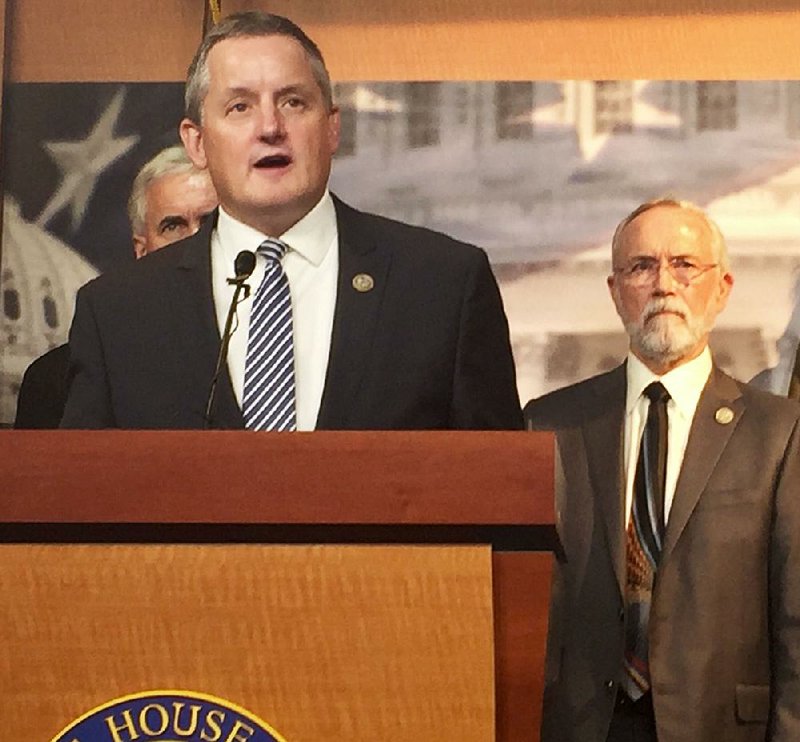WASHINGTON -- The U.S. House of Representatives on Wednesday approved legislation that would make it harder for environmentalists to derail federal forest management plans.
The measure passed 232-188. Ten Democrats supported the measure; nine Republicans opposed it.
A member of the Arkansas delegation, 4th District U.S. Rep. Bruce Westerman, sponsored HR2936, also known as the Resilient Federal Forests Act of 2017.
The Hot Springs Republican, who holds a master's degree in forestry from Yale University, said the U.S. Forest Service needs more flexibility as it battles to save millions of acres of trees and timberland.
Forests in "many areas across our country have been mismanaged for decades. The ones that have not already been destroyed are ripe to be devastated by insects, disease or catastrophic wildfire," Westerman told his colleagues. "Because of [inaction], our forests are overstocked, underutilized and unhealthy."
Arkansas' U.S. Reps. Rick Crawford and Steve Womack supported the legislation. U.S. Rep. French Hill did not vote on the measure.
While lawmakers debated the legislation, firefighters were battling two large blazes in California. California fires this fall have killed 43 people. So far this year, more than 8.8 million acres have burned across the country, an area larger than the state of Maryland.
The Forest Service alone has spent more than $2.5 billion battling the blazes.
The Arkansan's bill would speed up the review process for certain forest management practices.
Actions affecting 10,000 acres or less would not require a new environmental assessment or an environmental impact statement if the primary purpose was to battle disease or insect infestation, cut hazardous fuel loads, safeguard water supplies or protect critical habitat areas.
Plans developed collaboratively with area stakeholders could skip the additional regulatory hurdles if they involved 30,000 acres or less.
In addition, the bill would prevent environmentalists from recouping their attorney's fees when they sue to block forest management plans.
Westerman's legislation also would make it easier for the U.S. Forest Service to get more money in years when firefighting costs are abnormally high.
The Forest Service could seek additional funding once firefighting costs surpassed the 10-year average for those costs.
Currently, the Forest Service engages in a practice known as "fire borrowing," taking money that was allotted for forest management and using it instead on firefighting.
In federal fiscal 1995, only 16 percent of the Forest Service's budget was spent on firefighting. By 2015, it had topped 52 percent. Barring changes, the agency estimates that firefighting will consume two-thirds of its budget by fiscal 2025.
U.S. Rep. Rob Bishop, the Utah Republican who chairs the House Natural Resources Committee, said passage of Westerman's legislation is critical for the Forest Service.
"They need these tools. We don't give them these tools, we exacerbate our wildfire problems," he said.
But U.S. Rep. Jared Huffman, D-Calif., said the legislation would "gut" environmental laws.
"Let's call this bill what it is. It is an environmental wrecking ball that weakens standards and protections, limits public participation in the review of federal agency actions and won't make our forests any healthier or safer," he said.
U.S. Rep. Kurt Schrader, D-Ore., said Westerman's bill would help end "the endless, frivolous litigation" that slows down forest management in his state, predicting that it would also help revive the economy in some rural areas.
"On balance, frankly, this is a very good bill and much needed at this time," he said.
As the votes were cast Wednesday evening, Westerman's staff members monitored the tally on television, cheering once it was clear that a majority of lawmakers would support the measure.
Passage of the bill drew praise from Agriculture Secretary Sonny Perdue, who portrayed it as "an important step toward better management of national forests."
"As the legislative process continues, I look forward to working with Congress as we all seek a comprehensive solution to put America's forest back to work again," he said in a written statement.
House Speaker Paul Ryan, R-Wis., said Westerman's bill "provides the U.S. Forest Service with the tools necessary to combat overgrowth, disease and insect infestation in our forests, which will reduce the risk of catastrophic wildfire."
But others said the bill undermines environmental safeguards.
Shortly after Wednesday's vote, the Wilderness Society called Westerman's bill "reckless."
"Today's vote also strikes a significant blow at the landmark environmental law of our land by greatly increasing the amount of national forestlands that can be logged without public input or judicial review," said Megan Birzell, the group's national forest campaign manager. "The Senate should reject these irresponsible forest reforms."
In an interview, Westerman said his legislation "unties the hands of the experts in the Forest Service to do their job."
While the legislation fast-tracks forest management decisions in limited emergency situations, the public will continue to participate in the shaping of the overall forest management plans, Westerman said.
The goal, he said is "to shut down ... extremist lawyers who are making a killing off of the Equal Access to Justice Act," a law that allows litigants to recoup their attorney's fees from the government.
"It's a small group of individuals. I hope it does do something to deter what they're doing because their interest isn't in making the forests more healthy. Their interest is in lining their pockets with taxpayer dollars," he added.
A previous version of Westerman's legislation passed in the House during his first term in Congress, only to die in the Senate.
Westerman said he's hopeful that it will eventually pass this time, adding, "I think people are starting to understand the seriousness of this problem."
Metro on 11/02/2017

